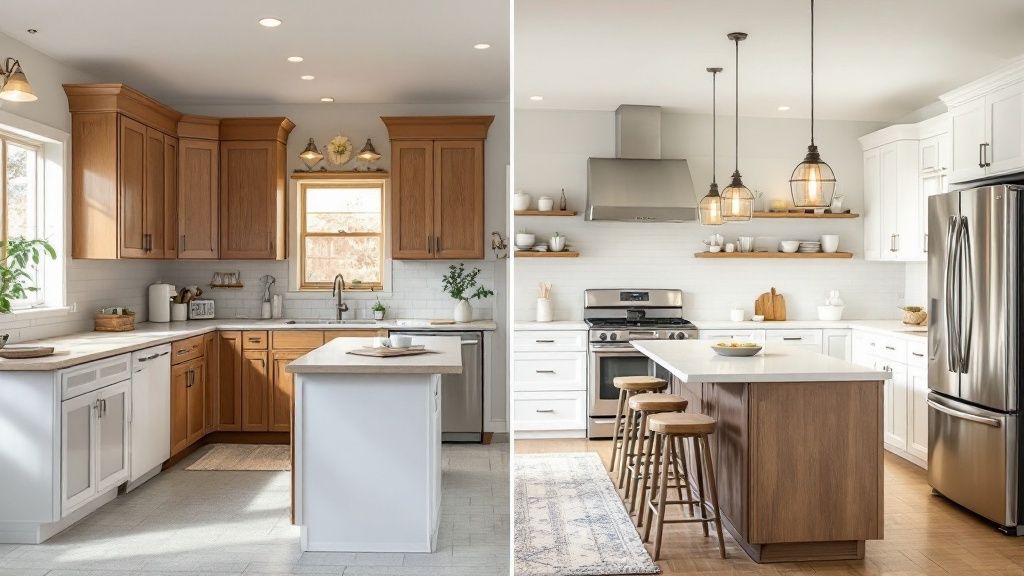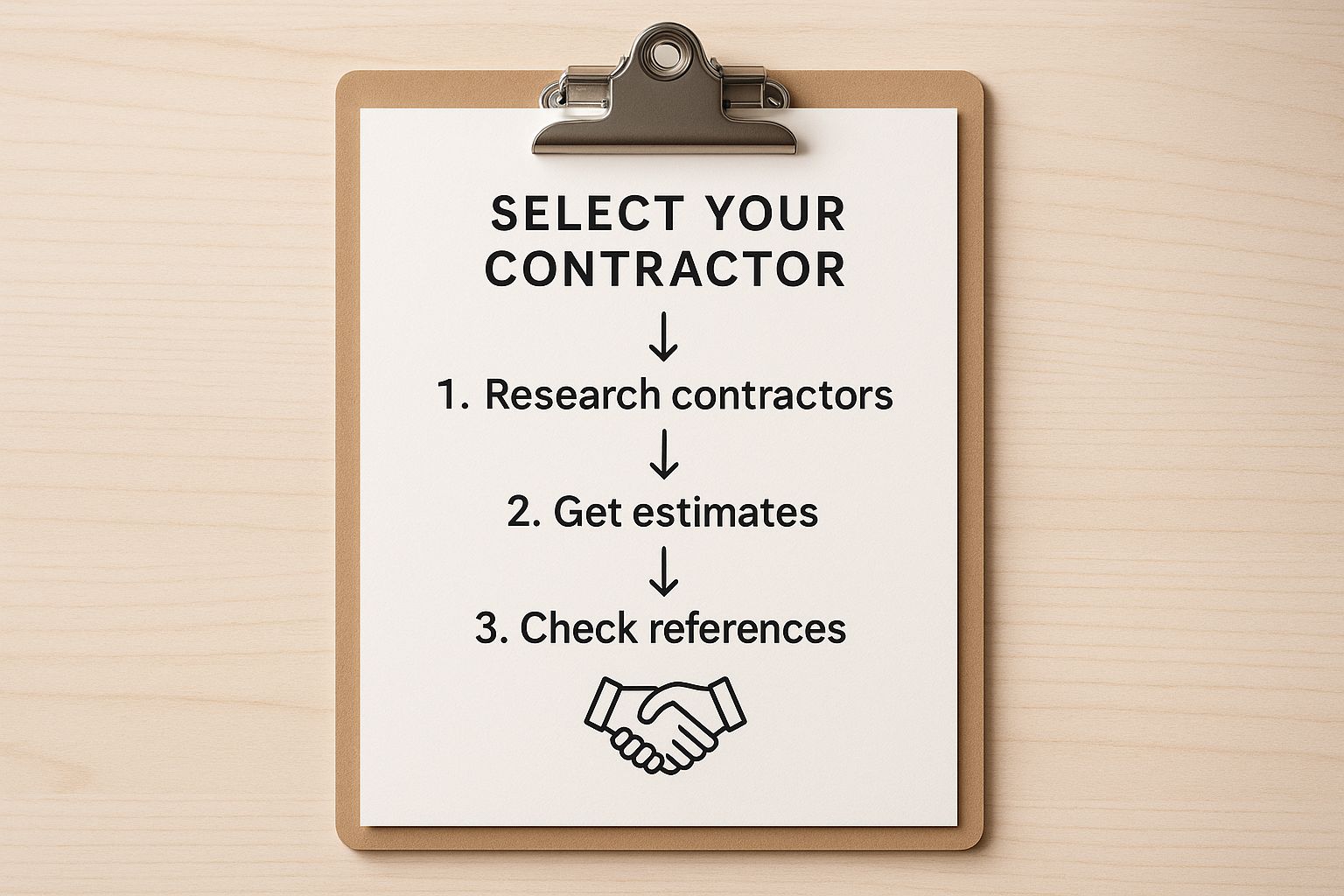When you start thinking about your remodel, the first big hurdle is finding the right people for the job. And while a quick search for "home remodeling contractors near me" might feel like a good start, the best leads often come from the real world—from people in your community who’ve been through this before.
Starting Your Search for the Right Contractor

Let's be honest, the contractor you choose can make or break your entire renovation experience. It’s about more than just getting the work done; it’s about finding a true partner. The goal here isn't to hire the first person you talk to. Instead, you want to build a solid list of 5 to 7 potential contractors to start vetting.
Tapping Into Your Local Network
Your most reliable referrals will almost always come from people you trust. Start close to home. Chat with neighbors who have recently had work done. They’ll give you the unfiltered truth about their experience—the good, the bad, and the ugly.
Don't forget about local social media groups. A simple post asking for recommendations for a kitchen remodel can open the floodgates. You'll not only get names but also the opportunity to connect with other homeowners who can share their stories.
Here's a pro tip that many people miss: talk to the staff at local supply houses. The folks at the tile store, the lumber yard, or the high-end appliance shop work with contractors every single day. They know who pays their bills on time, who does quality work, and who the pros trust. Their inside scoop is invaluable.
Leveraging Online Resources Effectively
After you’ve gathered some names from your network, it’s time to head online to fill out your list and do some initial digging. But you have to be smart about it.
- Portfolio & Review Sites: Platforms like Houzz and Angi are great for looking at past work and reading what previous clients have to say. Look for consistency in positive feedback, especially around communication and quality.
- Business Bureaus: A quick check on the Better Business Bureau (BBB) website can tell you a lot. You’re looking for a contractor with a solid rating and a clean history—it’s a basic but important checkpoint.
A remodeling contractor is a different breed from a new construction builder. They specialize in working inside lived-in homes. That means they get it—they know how to manage dust, protect your belongings, and work around your family’s schedule.
Remember, this first phase is all about casting a wide but smart net. By mixing word-of-mouth referrals with some strategic online research, you’re setting yourself up to find a truly great partner. For those planning bigger projects, getting a feel for the full scope of home remodels can really help put these initial conversations in context. A little homework now pays off massively down the road.
How to Vet and Shortlist Your Top Candidates

You’ve got a list of names. Now comes the real work: turning that list into a handful of truly viable candidates. This is where you move from searching to scrutinizing, and honestly, it’s the most critical step in protecting your investment and your sanity.
The goal here is to whittle down that initial list of 5-7 possibilities to the top 3-4 contenders you’ll actually meet with. Think of this as your due diligence phase. You want to walk away feeling confident that anyone who makes the final cut is qualified, professional, and fully capable of delivering on their promises.
First Things First: The Deal-Breakers
Before you get wowed by a slick portfolio, you have to verify the absolute non-negotiables. Getting this wrong can expose you to some serious financial and legal headaches down the road.
Start with their license. A legitimate contractor will have a state-issued license, period. You can usually look this up right on your state's contractor licensing board website. This quick check not only confirms they’re operating legally but often reveals if there are any formal complaints filed against them.
Next up is insurance. There are two policies they absolutely must have:
- General Liability: This is what protects your home and property from any damage caused by the contractor or their crew.
- Workers' Compensation: This protects you. If a worker gets injured on your property, this insurance covers them, preventing you from being held liable.
Don't be shy about asking for proof. Requesting a certificate of insurance is standard practice. Any professional contractor will have it ready to go. If they hesitate or give you the runaround, that’s a massive red flag. Cross them off the list and don't look back.
Go Beyond the Highlight Reel
With the essentials confirmed, it’s time to dig into their actual work and what past clients have to say.
Kick things off by deep-diving into their project portfolio. You're looking for more than just pretty pictures; you're looking for relevance. If you’re planning a major kitchen gut job, seeing a portfolio full of simple bathroom vanity swaps isn’t going to cut it. You need evidence they’ve handled projects with a similar scope and style to your own. Knowing what goes into a successful project yourself can help you spot quality work—for example, you can learn more about how to plan a kitchen remodel here.
After you've seen the work they want you to see, go find out what their real clients think. Check out third-party review sites and don't just skim the star ratings. Read the reviews.
Look for trends in what people are saying, both good and bad.
- Are clients consistently praising their communication skills and job site cleanliness? That's a great sign.
- Do you see repeated complaints about missed deadlines or surprise charges? Pay attention to that.
A single bad review isn't the end of the world, but a pattern of similar issues is a clear warning. This is how you get a feel for the true customer experience, not just the polished final product. This combination of checking credentials and reading between the lines of past projects will help you confidently build a shortlist of the best possible contractors for your job.
Interviewing Contractors and Spotting Red Flags
This is where the rubber meets the road. You've looked at pictures and read reviews, but now it's time to sit down and talk, human to human. Don't think of this as just an interview; it's a conversation to see if you can build a real partnership. After all, this person and their team will be a fixture in your home for weeks, maybe even months. Your goal is to get a feel for their process, how they communicate, and—most importantly—how they handle the inevitable bumps in the road.
This infographic lays out the essential steps for narrowing down your choices and making a confident decision.

Breaking it down like this helps turn what feels like a monumental choice into a series of manageable steps.
Asking the Right Questions
Vague questions only lead to vague answers. If you want to get a true sense of how a contractor runs their business, you have to be specific. The answers they give (or don't give) will tell you everything you need to know about their experience, their professionalism, and whether you'll actually work well together.
A great starting point is their project management style. Ask them directly, "Who is my dedicated point of contact once we kick things off?" This simple question reveals their entire communication structure. You’re looking for a clear answer, like a specific project manager, not a runaround where you have to hunt down different people for updates.
Then, you need to probe how they handle the unexpected. Try this: "Walk me through your process for a change order."
- A pro will immediately describe a formal, written procedure.
- They’ll talk about documenting the change, getting your signature on the new costs, and officially updating the project schedule.
- An answer like, "Oh, we're flexible, we just figure it out," is a huge red flag.
The home remodeling market is hotter than ever, with the number of businesses jumping by 18.3% between 2020 and 2025. This boom means more choices, but it also means you have to be extra sharp to find the truly seasoned professionals. You can find more home remodeling statistics on Fixr.com to see just how much the industry is growing.
Coming prepared with thoughtful questions is the best way to separate the contenders from the pretenders. To help you structure these crucial conversations, we’ve put together a checklist of questions.
Key Questions to Ask Potential Contractors
| Communication | Who will be my single point of contact, and how often will I receive updates? | A clear chain of command (e.g., "Our project manager, Sarah") and a consistent communication schedule (e.g., "daily check-ins and a weekly summary"). |
| Project Management | What project management software or tools do you use to keep clients informed? | Mention of specific platforms (like Buildertrend or CoConstruct) shows they are organized and value transparency. |
| Problem Solving | Can you give me an example of a project that went off-track and how you fixed it? | Look for honesty, accountability, and a focus on solutions rather than blaming subcontractors or suppliers. |
| Subcontractors | Do you use your own employees or subcontractors? How long have you worked with them? | A long-standing, loyal team of subcontractors is a great sign of stability and quality workmanship. |
| Contingency | How do you handle unforeseen issues, and what percentage should I budget for contingency? | A professional will have a standard contingency amount (usually 10-15%) and a clear process for addressing surprises. |
| Logistics | What's your plan for daily cleanup, dust control, and protecting the rest of my home? | They should have a detailed plan for containment, daily sweeping, and minimizing disruption to your life. |
Having these questions handy ensures you can compare each contractor on an apples-to-apples basis, making your final decision much clearer.
Watching for Warning Signs
Sometimes, the most telling signs are the things left unsaid. Trust your intuition. A good contractor will listen, answer your questions patiently, and make you feel comfortable. If you feel rushed, dismissed, or pressured, that's your cue to move on.
One of the biggest red flags is a contractor who pressures you for a large upfront payment. A reputable professional will have a clear payment schedule tied to project milestones. In many states, the maximum legal deposit is 10% or $1,000, whichever is less.
Keep an eye out for these other potential deal-breakers:
- Vague or Evasive Answers: If they can't give you a straight answer about their license, insurance, or process, it's a no-go.
- Hesitation to Provide References: A contractor with a trail of happy clients will be proud to share their contacts. If they balk, there's usually a reason.
- An Unprofessional Demeanor: This covers everything from showing up late without a call to bad-mouthing other contractors or past clients.
Ultimately, finding the best home remodeling contractors near me is about more than just finding someone who can swing a hammer. It's about finding a transparent, reliable, and trustworthy partner. This interview is your single best tool for making sure you’ve found the right one.
Making Sense of Remodeling Bids and Estimates
Once the interviews are done, the bids will start rolling in. This is the exciting part, but it can also get overwhelming fast. Trying to compare estimates from different contractors often feels like you're comparing apples and oranges—everyone seems to structure their proposals a little differently.
A good bid is so much more than a single number slapped at the bottom of a page. Think of it as a detailed roadmap for your entire project. You'll want to see a proposal that breaks everything down into clear, individual line items. That kind of transparency is your best friend when it comes to avoiding surprise costs down the road.
What to Look For in a Detailed Bid
A truly professional estimate should be thorough, but also easy to follow. Vague proposals are a massive red flag. Why? Because they leave far too much room for interpretation, which almost always leads to extra charges later. When you're searching for "home remodeling contractors near me," finding one who provides this level of detail is a sign you've found a real pro.
A comprehensive bid should always include:
- Labor Costs: A clear breakdown of the work required for each stage, from the messy demolition all the way to the final touch-ups.
- Material Costs: Specifics are key here. Look for brand names, quantities, and prices for all the materials going into your home.
- Allowances: These are essentially budget placeholders for items you haven't picked out yet, like faucets, tile, or light fixtures. Make sure these figures seem realistic for what you want.
- Permits and Fees: An itemized list of all the necessary building permits and any related city or county fees.
- Subcontractor Bids: Any costs for specialized trades like plumbing, electrical work, and HVAC should be spelled out clearly.
Getting this level of detail is non-negotiable. It proves the contractor has actually thought through every single aspect of your job instead of just throwing a number at the wall and hoping it sticks.
It’s Not Just About the Price Tag
We all do it—our eyes immediately jump to the lowest price. But in remodeling, that's often a recipe for disaster. The cheapest bid is almost never the best value. An unusually low estimate is a warning sign that a contractor might be cutting corners, using cheap materials, or, worse, planning to hit you with a bunch of "unforeseen" costs once they've torn your house apart.
Instead of focusing only on the final number, try to evaluate the value each bid offers. Maybe one contractor is a bit more expensive because they include top-notch dust control systems to keep your home clean, or they assign a dedicated project manager to your job. From my experience, those are the kinds of things that make a renovation go from stressful to smooth, and they are absolutely worth paying for.
Don't let the price be your only guide. The real question isn't "Which bid is the cheapest?" It's "What am I actually getting for my money with each of these proposals?" A slightly higher bid from a contractor you've vetted and communicate well with is always the safer, smarter investment.
How the Market Plays a Role
The numbers you see in a bid are also influenced by what's happening in the wider market. Current homeowner trends have a big impact on what contractors are busy with and, as a result, how they price their work. For example, 2025 data shows a huge demand for kitchen (38%) and bathroom (26%) remodels. These continue to be the most popular projects, which can affect scheduling and pricing for the best local contractors. You can dig deeper into 2025 remodeling industry trends on advancedesignstudio.com.
By taking the time to really dissect each proposal and understand the value behind the numbers, you can move forward with confidence. This careful analysis is what ensures you're not just hiring someone to swing a hammer, but investing in a great experience and a beautiful, high-quality result.
Getting the Contract Right and Gearing Up for Demo Day
You've done the legwork—the interviews, the reference checks, the portfolio reviews—and you've finally picked your contractor. Now comes the most critical piece of paperwork you'll sign for this project: the contract. Think of this document as the official playbook for your renovation. It’s what turns your vision into a concrete, legally-binding plan, and it's your single best tool for protecting your investment. Don't just skim it; dive deep.
A good contract is all about specifics. It needs to spell out the entire scope of work in excruciating detail, from the first swing of the sledgehammer to the final brushstroke of paint. A vague line item like "install kitchen cabinets" just won't cut it. It should specify the brand, style, color, and hardware—leaving zero room for interpretation later on.
The Must-Haves in Your Remodeling Contract
Before you sign anything, make sure these non-negotiable elements are clearly laid out. A professional contractor will have these covered, but it's your job to verify them.
A detailed payment schedule is paramount. You should never, ever pay a massive sum upfront. Instead, payments should be tied to tangible progress. For example, a payment is due after the framing passes inspection, not just after a certain number of days on the job. This keeps everyone motivated and aligned.
Next, you need firm dates. The contract has to include a solid start date and a projected completion date. Of course, things happen—a surprise blizzard or a supply chain snafu—but having these dates in writing establishes a clear timeline and holds everyone accountable.
Finally, make sure there’s a crystal-clear change order procedure. It's almost a guarantee that something will change. Maybe you'll fall in love with a different countertop, or the crew will discover some old, funky wiring behind a wall. The contract needs to explain precisely how these changes are handled: documented, priced out, and approved by you in writing before the new work begins.
Prepping Your Home for a Smooth Kickoff
Once the ink is dry, it’s time to shift gears and prepare your home (and your sanity) for the work ahead. Even the most considerate home remodeling contractors near you will bring some level of disruption. A little prep can make a world of difference.
- Create a Command Center: Talk to the crew and designate a specific spot for their tools and materials. A corner of the garage or a neatly cordoned-off section of the driveway works well.
- Set Up a "Life Support" Zone: If your kitchen is going under the knife, you’ll need a temporary solution. Set up a mini-kitchen in another room with the essentials: a microwave, coffee maker, and maybe a small fridge.
- Protect Everything: Construction dust is relentless and gets everywhere. Move furniture, artwork, and any valuables far away from the work zone. For items that can't be moved, cover them thoroughly with plastic sheeting and tape.
Clear communication is just as vital as a well-prepped space. Before Day One, have a chat with the project manager to set some ground rules. Agree on things like daily start and end times, the best way to communicate (a quick daily text? an end-of-day email?), and which parts of your home are completely off-limits to the crew.
This kind of prep work is more important now than ever. Homeowner demand for renovations is strong, and a recent Harvard housing study projects that spending will remain near peak levels through 2025 before climbing again. This means the best contractors are in high demand. Starting your project with a rock-solid contract and a well-prepared home ensures you kick things off on the right foot, setting the stage for a successful and less stressful renovation.
Common Questions About Hiring a Remodeler
When you start looking for a contractor, a lot of questions pop up. It’s completely normal. Thinking through things like payments, timelines, and what to do if you disagree can save you a world of hurt down the road. Let's walk through some of the biggest concerns we hear from homeowners.
How Should I Pay a Contractor?
Money is always at the top of the list. Here’s a major red flag: a contractor asking for a huge chunk of cash upfront. A true professional won’t do this. In many places, there are legal limits to the down payment—often 10% of the total project cost or $1,000, whichever is less.
A solid payment schedule should always be tied to progress you can actually see, not just dates on a calendar. For example, a payment might be due after the old kitchen is gone and the new framing is up and inspected. This way, you’re only paying for completed work.
This milestone-based approach protects everyone involved and keeps the project moving forward without any financial surprises.
What About Timelines and Handling Disagreements?
"How long will this really take?" It's a question every homeowner asks. An experienced remodeler can give you a pretty accurate timeline, but it's important to remember that construction is full of surprises. Issues like finding unexpected water damage behind a wall or waiting on a back-ordered appliance can definitely happen.
A well-written contract will have a plan for these kinds of hiccups. The absolute key is open communication. Your contractor should be giving you regular updates and telling you about potential delays the moment they see them coming.
But what if you and your remodeler just don't see eye-to-eye on something?
- Go Back to the Contract: Your signed agreement is your guide. It should clearly define the project scope and have a section on how to handle changes or disputes.
- Put It in Writing: After a phone call or site meeting, send a quick email to recap what you talked about. This creates a simple paper trail and prevents any "he said, she said" confusion.
- Look for a Solution, Not Blame: Try to approach the conversation as a team. The goal is to find a fair solution that gets the project back on track, not to win an argument.
Asking a potential contractor how they handle these situations is just as critical as looking at their past work. It tells you a lot about their experience and how they treat their clients. As you think about the financial side of things, it’s also smart to know which projects add the most value. You can learn all about that in our guide to the best home remodel return on investment.
Ready to transform your vision into reality with a team you can trust? Contact Northpoint Construction today for a consultation and see how we can make your dream home happen. https://buildnp.com

